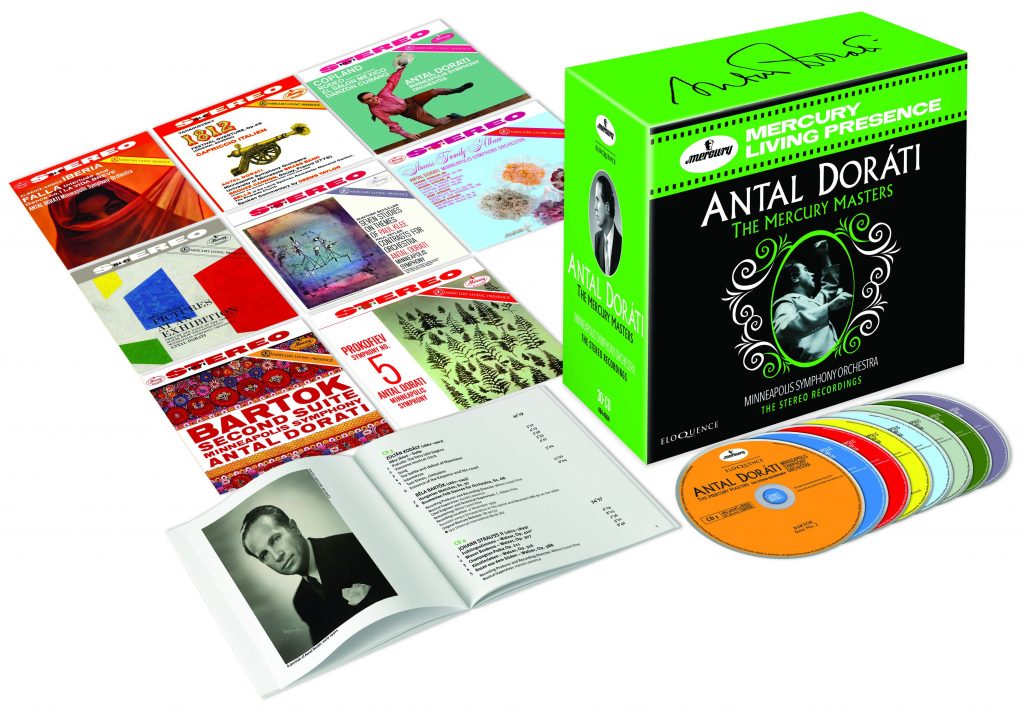


“fiery, colourful and warm-blooded and superbly recorded” Tempo
“Sonically it is hair-raising” Hi-Fi Review
Released 12 June 2023
CD 1
BARTÓK Suite No. 2
FIRST COMMERCIALLY RELEASED STEREO RECORDING BY MERCURY
CD 2
R. STRAUSS
Suite from ‘Der Rosenkavalier’
Till Eulenspiegels lustige Streiche
CD 3
KODÁLY Háry János – Suite
BARTÓK Hungarian Sketches
Roumanian Folk Dances
CD 4
JOHANN STRAUSS II Waltzes
FIRST RELEASE OF COMPLETE LP ON CD
CD 5
BARTÓK Violin Concerto No. 2
Yehudi Menuhin
CD 6
BEETHOVEN Symphony No. 3 ‘Eroica’
CD 7
ROSSINI Overtures
CD 8
OFFENBACH (arr. Rosenthal) Gaîté Parisienne
STRAUSS II (arr. Doráti) Graduation Ball
CD 9
ALBÉNIZ (orch. Arbos) Iberia
FALLA Interlude and Dance No. 1 (La Vida Breve)
CD 10
BRAHMS Symphony No. 2
CD 11
Strauss Family Album
FIRST RELEASE OF COMPLETE LP ON CD
CD 12
COPLAND Rodeo; El Salón México
Danzon Cubano
GERSHWIN An American in Paris
CDs 13–14
DELIBES Coppélia
CD 15
TCHAIKOVSKY 1812 Overture
(including spoken commentary)
Capriccio italien
Deems Taylor
CDs 16–17
DVOŘÁK Slavonic Dances
SMETANA The Bartered Bride – Dances
CD 18
RIMSKY-KORSAKOV Scheherazade
CD 19
TCHAIKOVSKY March slave
Eugene Onegin – Waltz & Polonaise
Francesca da Rimini
CD 20
RICHARD STRAUSS Don Juan
Tod und Verklärung
CD 21
STRAVINSKY Petrouchka
CD 22
MUSSORGSKY Pictures at an Exhibition
Khovanshchina – Prelude & Dance of the Persian Slaves
CD 23
BLOCH Sinfonia breve
PETERSON Free Variations for Orchestra*
*FIRST RELEASE ON CD
CD 24
PROKOFIEV Symphony No. 5
CD 25
STRAVINSKY Le Sacre du printemps
CD 26
DORÁTI Symphony
Nocturne and Capriccio
Antal Doráti Interview°
Roger Lord; Allegri String Quartet
Dennis D. Rooney
FIRST RELEASE ON CD
°PREVIOUSLY UNPUBLISHED
CD 27
SCHULLER Seven Studies
FETLER Contrasts for Orchestra
CD 28
RACHMANINOFF Piano Concerto No. 2
Two Preludes
Byron Janis
CD 29
RESPIGHI Pini di Roma
Fontane di Roma
CD 30
The Magic of the Bells
Kamiel Lefévere
FIRST RELEASE ON CD
“The playing is excellent … The Suite, for all that it is so rarely heard, could well become a popular favourite like the Concerto for Orchestra.” Gramophone, December 1956 (Bartók: Suite No.2)
“The performance is decidedly suggestive and skilful, reproduced with a sensitivity to the complex score that captures more of its finer essences than anyone but the conductor usually can hear.” High Fidelity, February 1957 (Strauss: Der Rosenkavalier suite)
“The most vivid and theatrical of all the Petrouchkas on record.” Gramophone, July 1957 (Stravinsky: Petrouchka)
“The recording is sensationally fine, the interpretation generally brilliant, sensitive, and penetrating.” High Fidelity, December 1957 (Bartók: Violin Concerto No. 2)
“This is a big, romantic piece, despite the considered logic of its organization, and Menuhin plays it in a big, romantic fashion. The technical demands of the score are amply realized; the tone has warmth and nobility, with a touch of morbidezza in the Andante. Doráti and the orchestra are in complete accord with the soloist.” Musical Quarterly, April 1958 (Bartók: Violin Concerto No. 2)
“You well may delight in riding a flamboyantly shocking-pink horse on Doráti’s high-powered merry-go-round.” High Fidelity, April 1958 (Offenbach: Gate Parisienne)
“I have the feeling that I am standing next to the conductor. As a result, the strings and the woodwinds emerge with a clarity that I have seldom heard on records … his is one of the most satisfying readings that I have ever heard of the ‘Eroica’.” Hi-Fi Review, May 1958 (Beethoven: Symphony No. 3)
“A zestful, temperamental, all-out kind of interpretation, sensationally well recorded … Doráti’s performance and Mercury’s sound give the music extraordinary freshness and vividess.” High Fidelity, September 1958 (Copland: Rodeo, etc)
“Under Doráti, the Minneapolis orchestra has developed into an extraordinarily virtuosic ensemble … Doráti spent quite a few years in Texas; he ought to do Rodeo well, and he certainly does.” Hi-Fi Review, October 1958 (Copland: Rodeo, etc.)
“Breath-taking, this Doráti. This sets the seal on my growing conviction that he is the leading exponent of classical ballet scores anywhere … The Minneapolis Orchestra plays like what it has in fact become: one of the top symphonic organizations on either side of the Atlantic.” High Fidelity, January 1959 (Delibes: Coppélia)
“I know of no recording that sets forth as clearly all the details of Brahms’s orchestration.” Music on Record, 1959 (Brahms: Symphony No. 2)
“Doráti’s performance of his own score is the epitome of balletic grace and dramatic gusto; and the present vibrantly lucid, superbly crisp, and beautifully blended stereoism is as technically flawless as it is sonically and melodically intoxicating.” High Fidelity, January 1959 (J. Strauss II: Graduation Ball)
“The sound is quite muscular, but an exquisiteness is revealed that sets the album apart. The Minneapolis orchestra has never sounded so alive nor so subtle.” Hi-Fi Review, February 1959 (Delibes: Coppélia)
“Doráti’s Till is a vigorous rapscallion who misbehaves as tradition dictates and goes to the gallows unreformed.” High Fidelity, May 1959 (Strauss: Till Eulenspiegel)
“Estimable performances of both symphonies which suit Dorati very well, for he is at his best in fleet, athletic music.” Gramophone, May 1959 (Beethoven: Symphonies Nos. 4 & 8)
“Doráti is at his best in delivering these musical bon-bons… superlatively sensitive performance. By all means add it to your library.” Hi-Fi Review, June 1959 (Strauss Family Album)
“Brilliantly vivacious accounts, rhythmically alive and glitteringly played.” Gramophone, July 1959 (Offenbach/J. Strauss)
“There is no doubt that Doráti has a deep and abiding Iove for the music of Bartók. He conducts with a deft and sensitive touch, as well as with humour … a must for the Bartók fan.” Hi-Fi Review, July 1959 (Bartok: : Hungarian Sketches, Romanian Dances)
“Sonically it is hair-raising … The Slavonic Dances are carried off superbly-furious in the right spots, meltingly nostalgic, and everywhere delivered with just the right amount of control … Mr. Doráti is the master to serve the ingredients up on an orchestral platter that will raise goose-pimples.” Hi-Fi Review, June 1959 (Dvorak: Slavonic Dances)
“Dorati’s capacity for getting pointed playing serves him well in Rossini … Enjoyable in every way.” Gramophone, January 1960 (Rossini: Overtures)
“There probably isn’t a better Scheherazade around.” High Fidelity, January 1960 (Rimsky-Korsakov: Scheherazade, stereo version)
“Doráti is very much at home in Mussorgsky’s picture gallery. He has captured the spirit of each movement and is careful to bring out all the important details, yet nothing is dragged or made ponderous.” High Fidelity, March 1960 (Mussorgsky: Pictures at an Exhibition)
“Recording, as is always the case with Mercury and the Minneapolis Symphony, is as fine as it comes. The interpretation sounds excellent in both cases.” High Fidelity, September 1961 (Schuller)
“The finest performance of it is undoubtedly the one by Doráti and the Minneapolis Orchestra, fiery, colourful and warm-blooded and superbly recorded.” Tempo, December 1962 (Kodály: Háry Janos)
“Polished, complete, and charming music of an old-fashioned and familiar type. It is hardly surprising that Doráti manages a convincing reading of his own music; the Minneapolis Orchestra does its part in fine style. The chamber performance, recorded under the composer’s supervision, is equally commendable.” High Fidelity, September 1963 (Doráti: Symphony; Nocturne and Capriccio)



